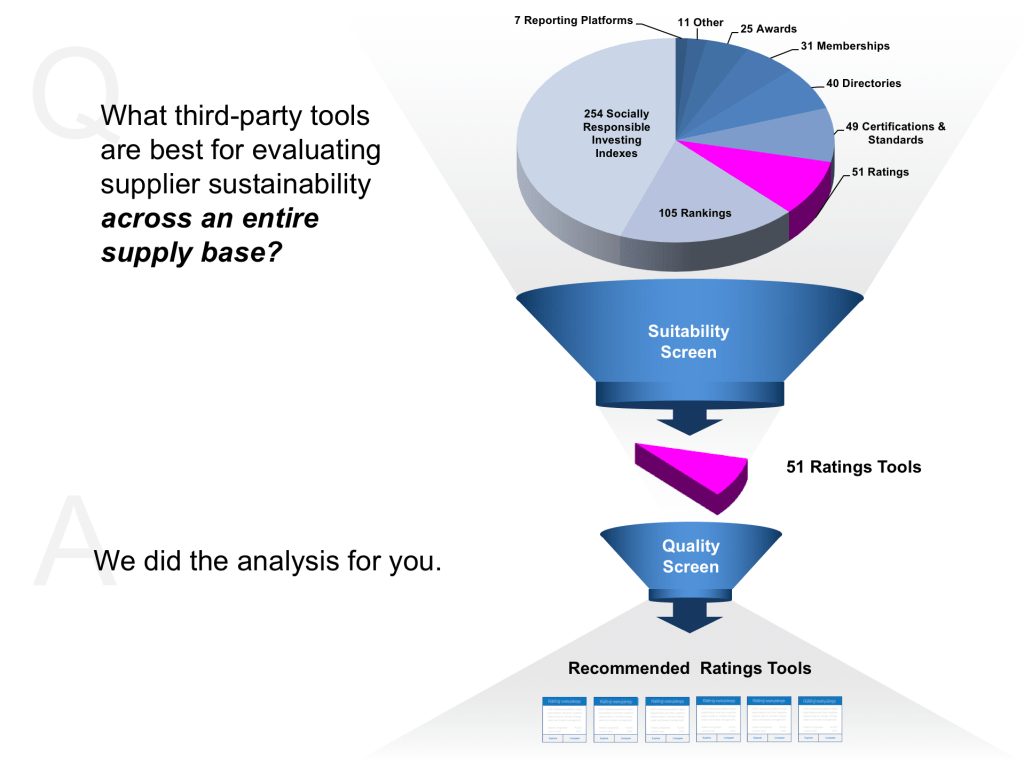The Sustainable Purchasing Leadership Council (SPLC) recently released the results of its new, independent comparative tool for sustainable procurement ratings and EcoVadis is excited to share we’ve secured the highest ranking in the framework.
SPLC’s new rating program compares and recommends third-party tools best suited for evaluating supplier sustainability at an enterprise level. Each tool was screened against 40 criteria important for credibility within a supply chain and procurement context, including: the extent of sustainability issues covered, rigor of data verification, coverage and accessibility across geographical regions and sectors, transparent and impartial rating methodologies, scalability, consistent performance and more.
EcoVadis scored high in all these categories, based the research and advisement of over 45 companies, government agencies, and NGOs. Over 70 percent of our customers are small and medium sized companies, highlighting EcoVadis’ relevancy for addressing the realities of global supply chains.
Why enterprise sustainability performance?
In their work to evaluate the various options available rating platforms, the SPLC focused on enterprise-level sustainability ratings because they are the most practical and defensible method of evaluating an entire supply base and making sustainability ratings accessible to all suppliers, at any maturity level. This enables companies to see who their leading suppliers are in terms sustainability performance, and evaluate partners in a way that encourages leadership and continuous improvement.
Case example: Tessy Plastics uses EcoVadis as “guidepost”
Tessy Plastics, a medium sized plastic manufacturer who was rated as part of Johnson & Johnson’s program, is a great example of a company that proactively leveraged supplier sustainability ratings to improve and facilitate true sustainable business transformation. The company used the results of their EcoVadis assessment to build out their sustainability program and drive business growth at the same time.
Cindy Bush, Tessy’s environmental health and safety director, says that ‘being asked to do the sustainability assessment really helped propel us towards the success the company is experiencing today. Having a shared platform where assessments could be routed to many customers with one simple click of a mouse really helped us make headway and prevented audit and survey fatigue. We also developed our first EHS management team in response to some of the questions in supplier sustainability ratings scorecards, which led to several significant operational improvements that distinguished us from competitors.”
Since 2012, Tessy has reduced company-wide waste by 53 percent, which is a big achievement considering the company has tripled in size and number of employees in that same period. The team also noted that taking better care of physical workplace conditions has led to lower accident rates, and changing the way they did business has contributed to lower carbon emissions. This transformative sustainability progress didn’t go unnoticed: Tessy was named a Johnson & Johnson sustainability award winner in 2015, and was also selected to speak at the UN’s private sector conference on sustainable development goals due to its proven commitment and progress in SDG adherence. Watch the webinar here:
Enterprise supplier sustainability ratings offer a strong foundation for all organizations to implement real, lasting operational changes that are not only good for the global community and planet, but also for employees and the business.
To learn more about the new SPLC ratings and EcoVadis’ evaluation, please visit our profile page on the SPLC Insight site.


